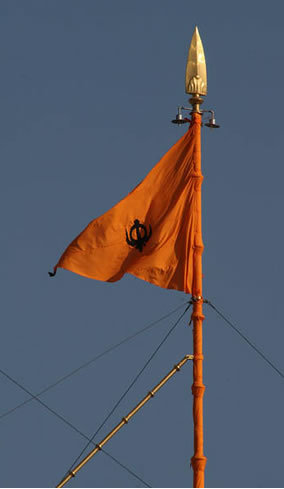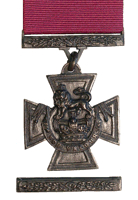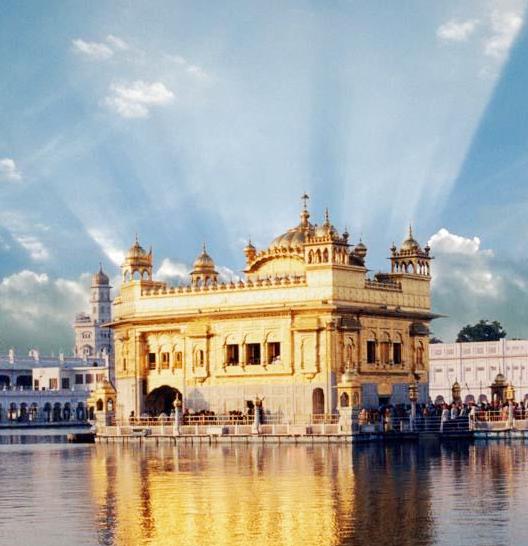Sikh
| Part of a series on Sikhism |
|
|
The word Sikh literally means 'a learner', or 'a student', and is derived from the Sanskrit word shishya. In the Punjabi language the word Sikh also means to learn.
A Sikh is a follower of the religion called Sikhi, or, Sikhism, the fifth largest organised religion in the world. Sikhs are disciples of the ten Sikh Gurus, divine spiritual messengers who established the religion over the 15th to the 17th century. The sacred scripture Guru Granth Sahib, consisting of the revelations of the Sikh Gurus and several saints from Hindu and Muslim backgrounds, is now the perpetual spiritual guide for the Sikhs, accorded the same respect and service as a living Guru.
Guru Nanak, born in 1469 in a village of the Punjab province of the Indian subcontinent, was the first of the human form Sikh Gurus. The tenth and last human master was Guru Gobind Singh, who decreed the scripture Guru Granth Sahib to be the eternal Guru of the Sikhs.
Who is a Sikh?
A Sikh is a person who takes his spiritual guidance only from the Sikh Gurus; who practices belief and remembrance (Simran) of the one God (commonly referred to as Waheguru), at all times; believes in the equality of all beings and selfless service to humanity (Seva); believes in the protection of the weak (Kurbani); preservation of peace; the promotion of personal qualities of Sat (Truth); Daya (Compassion); Santokh (Contentment); Nimrata (Humility); and Pyare (Love); and who at all times constantly repels the inner five evils of Kam (Lust), Krodh (Rage), Lobh (Greed), Moh (Attachment) and Ahankar (Ego).
The Guru Granth Sahib defines the Sikh in these terms:
| SGGS Page 305 Full Shabad |
| Fourth Mehl:
One who calls himself a Sikh of the True Guru, |
The Guru requires the Sikh to lead a life of discipline; to rise early in the morning; to cleanse oneself both externally (bathing) and internally (Naam simran) ; to meditate on the Almighty; to discard negative traits of the mind; and grasp the positive vibes from the Guru's word (Gurbani). By doing this the Sikh will become pleasing to the Guru. A Sikh must know his or her duty to oneself, the family and the community and perform this to the best of his or her ability. To lead a life of Chardikala - "positive outlook" and "buoyant and optimistic attitude to life" accepting God's will as the ultimate reality. To study and seek spiritual guidance from the Guru at difficult times, to remember the Lord always and, at all times, to seek the company of the Sadh sangat - holy congregation or spiritually wise people.
The summary of the main beliefs of a Sikh:
- There is only one God for all the peoples of the world
- All are equal before this one God
- To respect all beings and to protect the weak.
- To live by one's honest labour and enterprise - Kirat Karni
- To remember the gift of life from the Almighty and to rely on Him only
- To engage in regular remembrance of God - Naam Japna and Simran
- One must live the life of a householder - committed to Selfless service (Sewa) to the community
- To shares one's wealth with the needy - Wand ka Chakna
- To be vigilant and defend one's life from the evil internal forces - Lust (Kham), Anger (Krodh), Greed (Lobh), Attachment (Moh), and Ego (ahankar).
- To promote positive qualities both personally and among the community. To embrace Sat (Truth); Daya (Compassion); Santokh (Contentment); Nimrata (Humility); and Pyare (Love) as positive qualities of life.
Sikh philosophy
- Main article: Sikhism
Guru Nanak, the founder of the faith, summed up the basis of Sikh lifestyle in three requirements: Naam Japo, Kirat Karni and Wand kay Shako, which means meditate on the holy name, Waheguru, work diligently and honestly and share one's fruits.
The Guru Granth Sahib is revered as a teacher in its own right, because it is a literal transcript of the teachings of the nine gurus who preceded it. The Sikh follows the Guru Granth Sahib strictly as his prime guide. It was compiled by the Sikh Gurus and is maintained in its original form. In addition to their own works the gurus also included the revelations of many saints of that period. Their followers, with their turban and uncut hair, are proud and definitely distinct; yet, they show respect to the followers of other religions as well as their religions. Non-Sikhs can partake fully in Sikh prayer meetings and social functions. Members of the Sikh faith pray daily for the well being of all mankind.
The concept of saint-soldier is another unique feature which sometimes confuses observers. Every Sikh is required to aspire to sainthood by his devotion to God and service to mankind, but also, according to the situation, to adopt the role of a soldier of Waheguru.
Sikhs are required to not renounce the world and are urged to aspire to be and do their best while not being obsessed by the act; wanting the best, but not craving to accumulate. Seva (service) is an integral part of Sikh worship. This practice is very easily observed in the Sikhs houses of worship the Gurdwara (temple/ lit. doorway to God). Visitors of any religion, class/caste or creed are welcomed. Langar - a free, abundant, vegetarian meal is shared in a community atmosphere to all visitors of Sikh Gurdwaras all over the world. Members of the Gurdwaras provide and prepare what can only be described as good home cooking. The meals are part of their service to their fellow women and men. Many Langars stay open on a 24 hour basis. The Langars is a practise started and developed by each of the nine Sikn Gurus to stress the equality of every human; even Moghul Emperors sat and ate among common men.
The Khalsa

Main article: Khalsa
The word "Khalsa" has two literal meanings. With its root in Sanskrit, it traveled through Persian, Arabic, Greek and the 'Romance Languages', returning centuries later to India and the Punjab with the Portugese, Persians and Arab invaders. One literal meaning is "Pure" and the other meaning is "belonging to the king". When the word "Khalsa" is used for a Sikh, it implies belonging to the King, where the King is TRUTH God himself. To become a Khalsa a Sikh must surrender him/her self completely to TRUTH God and obey God's will completely. Only then is a Sikh called "Khalsa."
A Sikh who has taken Amrit becomes a member of the Khalsa Institution which is "Pure" & flawless. There after he/she is believed to have pledged his/her life to Guru , and is expected not to desist from sacrificing anything and everything in a never ending struggle for the just cause of ensuring safety & welfare of the entire HUMANITY.
For more information on this Religion, see Sikhism.
Sikhs' Five Ks
- Main article: Five ks
Sikhs look different - ever wondered why? They take pride in wearing five items of faith on them at all times. Some do this out of respect for their tenth prophet, Guru Gobind Singh while others are under formal command of Khalsa and have made an oath to carry these five articles of faith. It is their moral duty to don these items. The persona formally declares them being saint-soldiers of "Akal Purakh", the 'Almighty Being' with a lifelong commitment to be at war against FALSEHOOD & TERRORISM.
These 5 items of faith are: Kesh, Kanga, Kara, Kirpan and Kacha which translate into: uncut hair, a small comb, a band of steel, a small sword, a pair of under shorts. Most male Sikhs will also wear a Turban over their uncut hair. The most "visible" items of faith are a turban and an untrimmed beard. This makes Sikhs stand out in a crowd, where ever they are.
The Sikh and His Guru
The relationship between the Sikh ('disciple') and the Guru ('Master') is very powerful and dominant and is central to understanding the reason for the strong dedication and devoted service that is performed by the followers of this religion. The Sikh believes that the tenth Guru is their spiritual father and that all other Sikhs are his/her spiritual brothers or sisters. The commitment by the disciple to the Guru is total as is the dedication of the Gurus to the Panth or followers. The Gurus have spoken very highly of their disciples.
Guru's Dedication to the Sikhs
Guru Gobind Singh says the following about his Sikhs or Khalsa ("the pure ones"):
The Khalsa is my true image. I dwell in the Khalsa. Khalsa is my chief purpose. I am forever with the Khalsa. Khalsa is my closest friend. Khalsa is my mother, father & my comfort. Khalsa is my caste & creed. My creation is through the Khalsa. Khalsa is my haven and storehouse. Because of the Khalsa I am honoured. Khalsa is my body & spirit. Khalsa is my life & soul. Khalsa is my total, true Guru. Khalsa is my courageous friend. Khalsa is my wisdom & knowledge. I will always contemplate for the Khalsa. Full tribute of the Khalsa is beyond me. It is impossible to truly praise the Khalsa with one tongue. I certify that in the above, nothing is false. God and Guru Nanak are my witnesses to this truth.
Further, several of the Sikh Gurus carried out extreme sacrifices - all for the furtherance of the cause and this was done without any regard for personal self-perservation, benefit or gain. Guru Arjan Dev, the fifth guru was martyred by the then Mughal ruler, Emperor Jahangir for not amending the Adi Granth, the Sikh Holy book to reflect his views.
The ninth Sikh Guru, Guru Tegh Bahadur became the 'leader' of the Kashmiri Hindus to protect and save these tribesmen from the tyranny of the rulers of the nation - He made the ultimate sacrifice and was martyred by Emperor Aurangzeb for not converting to Islam.
Guru Gobind Singh is remembered by the Sikhs as a prophet who has made the most sacrifice for the Panth or 'Community'. Not only did he have to endure the sacrifice of his father Guru Tegh Bahadur, but also his mother and all his four sons or Four Sahibzadas Ajit Singh, Jujhar Singh, Zorawar Singh and Fateh Singh.
On losing his sons, Guruji consoled their mother thus: "Mother of the Panth, What if our four sons are gone? They still live in God's Kingdom, and forever shall live the Khalsa, Millions of our brave and dear sons." Guruji further said that their sons were 4 'gifts of virtues' from God - Their death has passed these four great virtues into the Khalsa Panth - 'Ajit' means Invincible; 'Jujhar' means warrior; 'Zorawar' means Brave; and 'Fateh' is victory. So these qualities will live in our Khalsa."
The Sikh's commitment to the Guru
The baptised Sikh is called a Khalsa or the 'Pure One'. When Sikhs become Khalsas, they pledge their lives to the Guru - So their commitment is total. This devotion can be seen through history when the Sikhs have fought until death for the cause. The Battle of Saragarhi (1897) is remembered and honoured as one of many battles where the Sikhs have fought with unflinching strength. In the Battle of Saragarhi, the Sikh Havildar Ishar Singh with 21 other soldiers fought with ultimate and supreme bravery against 10,000 Afridi tribesmen. This battle has been taught as history in France for many years as a lesson in bravery and comradeship.
Many other such supreme sacrifices have been made by the Sikhs for their religion, their country or even their alliance partners. In the two great World Wars, over 80,000 Sikhs died for the British and Alliance force in a battles where they could have opted out. Many Sikhs received the Victoria Cross and the Param Vir Chakras for their gallantry and courage.
Duties of a Sikh
This section deals with the general duty of a Sikh to Society and God rather that his/her daily Practises which are dealt with in a subsequent section.
- Accept the Ten Gurus and SGGS as their Spiritual Teachers. Regularly study, meditate on and read the SGGS. Naam Japo; have faith in Guru & God.
- Live a householder life - honest, simple and family oriented Kirat Karni; Know you responsibilities and honour these.
- Contribute to the well being of Society by offering selfless service without receiving payment and give ten percent of their net income to a charity, poor person, worthy cause, etc. Wand kay Shako
- Treat every person as an equal irrespective of caste, creed, gender, profession, social status, age, race, ability, etc.
- Speak politely; forgive easily and be humble at all times - page 1384 - "Humility is the word, forgiveness is the virtue, and sweet speech is the magic mantra. Wear these three robes, O sister, and you will captivate your Husband".
- Avoid the five thieves - PAGAL - Pride, Anger, Greed, Attachment to Worldly things Maya and Lust.
- If you are a Baptised Sikh, Wear the 5Ks.
- Do not be cruel; nor have a negative outlook on life; Always have a Positive Attitude Chardi Kala.
- Do not practise rituals or superstitions; no fasting; no penances; Always be logical and scientific in your approach to any problem.
Daily Practises of a Sikh
The following is the daily routine to be followed by a practising Sikh:
- To rise early in the morning
- To have a shower or bath - Minimum to wash face, hands & feet.
- To mediate on God and recite the [Bani]s of the Guru - Japji Sahib, Jaap Sahib and 3 other banis. If possible to attend Gurdwara - Sikh Temple; to listen to Kirtan whenever possible.
- To perform Aardas, have breakfast and attend to the family needs
- To attend work, training, or study, etc and perform Kirit Karni
- To perform Aardas and have lunch
- Finish your daily work, school or college and return home to see to your family duties.
- In the evening after tea to recite or listen to the Rehras Sahib
- After Aardas, to have the evening meal and engage in recreational, Charitable, Social tasks
- Before bed to recite the Kirtan Sohila
Decorated Sikhs in the military

- Bana Singh - awarded the Param Vir Chakra.
- Captain Ishar Singh - The first Sikh to receive the Victoria Cross.
- Captain Gurbachan Singh Salaria - awarded Param Vir Chakra.
- Gian Singh - awarded the Victoria Cross.
- Lt. General Jagjit Singh Aurora - supervised the surrender of more than 90,000 Pakistani soldiers in East Pakistan (now Bangladesh) during the 1971 India-Pakistan war.
- Subedar Joginder Singh - awarded Param Vir Chakra.
- Lieutenant Karamjit Singh Judge - awarded the Victoria Cross.
- Lance Karam Singh - awarded the Military Medal in World War II and awarded Param Vir Chakra (the second person to receive Param Vir Chakra).
- Major Havildar Parkash Singh - awarded the Victoria Cross.
- Nand Singh - awarded the Victoria Cross.
Primary Beliefs & Principles:
- One God: - There is only ONE God who has infinite qualities and names; S/He* is the same for all religions;
- Re-incarnation, Karma & Salvation: - Every creature has a Soul; on death, the Soul is passed from one body to another until Liberation.
- Remember God: Love God but have fear of Him* as well.
- "Humanhood" (Brotherhood*): All human beings are equal. We are sons and daughters of Waheguru, the Almighty.
- Uphold Moral Values: Defend, safeguard and fight for the rights of all creatures and in particular your fellow beings.
- Personal Sacrifice: Be prepared to give your life for all supreme principles - see the life of Guru Teg Bahadur.
- Many Paths lead to God: - Sikhs are not Special: The Sikhs are not the chosen people of God - By just calling yourself a Sikh does not bring you salvation.
- Positive Attitude to Life: "Chardikala" - Always have a positive and optimistic view of life.
- Disciplined Life: Upon baptism, must wear the 5Ks; strict recital of the 5 prayers Banis, etc.
- No Special Worship Days: Sikhs do not believe that any particular day is holier than any other.
- Conquer the 5 Thieves: It every Sikhs duty to defeat these 5 thieves
- Attack with 5 Weapons: Contentment (Santokh), Charity (Daan), Kindness (Daya), Chardikala (Positive Energy), Humility (Nimarta)
For more on this section select Primary Beliefs and Principles
Underlying Values:
The Sikhs must believe in the following Values:
- Equality: All humans are equal before God - No discrimination is allowed on the basis of Caste, Race, Sex, Creed, Origin, colour, education, status, wealth, etc.
- God's Spirit: All Creatures have God's spirits and must be properly respected. Show love for all living things. Mistreatment of any living creature is tabooed and forbidden.
- Personal Right: Every person has a right to life but this right is restricted and has attached certain duties - Simple Living is essential.
- Actions Count: Salvation is obtained by one's actions - Good deeds, remembrance of God - Naam Simran, Kirtan, etc
- Living a Family Life: Must live as a family unit (householder) to provide and nurture children for the perpetual benefit of creation.
- Sharing: It is encouraged to share and give to charity 10 percent of one's net earnings.
- Accept God's Will: Develop your personality so that you recognise happy event and miserable events as one - the Will of God causes them.
- The 4 Fruits of Life: Truth, Contentment, Contemplation and Naam(GurBani or SatGur).
For more information on this section select Sikhism Underlying Values
Prohibited Behavior:
- Non-Logical Behavior: Superstitions; rituals, which have no meaning, pilgrimages, fasting and bathing in rivers; gambling; circumcision; worship of graves, idols, pictures; compulsory wearing of the veil for women; etc;
- Material Obsession: ("Maya") Accumulation of materials have no meaning in Sikhism. Wealth, Gold, Portfolio, Stocks, Commodities, properties will all be left here on Earth when you depart. Do not get attached to them.
- Sacrifice of Creatures: Sati - widows throwing themselves in the funeral pyre of their husbands; lamb and calf slaughter to celebrate holy occasions; etc
- Non-Family Oriented Living: A sikh is not allowed to live a recluse, beggar, yogi, monk, Nun, celibacy, etc
- Worthless Talk: bragging, gossip, lying, etc are not permitted.
- Intoxication: Drinking alcohol; Drugs; Smoking tobacco; consumption of other intoxicants; etc
- No priestly Class: Sikhs do not have to depend on a priest for any of the functions that need to be performed.
For more information on this section select Sikhism Prohibited Behaviour
Technique and Methods:
- Naam: Japo - Meditation & Prayer, Free Service Sewa, Simran, Sacred Music Kirtan
- Kirat Karni: - Honest, Earnings, labour, etc while remembering the Lord
- Wand kay Shako: - Share with Others who are deserving, Free Food langar, 10% Donation Daasvand, etc
For more information select Sikhism Technique and Methods
Other Observations:
- Not Son of God: The Gurus were not in the Christian sense "Sons of God". Sikhism says we are all Gods children and S/He* is our Father/Mother.
- All Welcomed: Members of All religions can visit Sikh temples ("Gurdwaras") but please observe the local rules - Cover Head, No shoes, No Smoking when going in to the Main Hall.
- Multi-Level Approach: Sikhism recognises the concept of a Multi-level approach to achieving your target as a disciple of the faith. For example, "Sahajdhari" (slow adopters) are Sikhs who have not donned the full 5Ks but are still Sikhs nevertheless.
For more information on this section select Sikhism Other Observations
'*' = the Punjabi language does not have a gender for God. Unfortunately, when translating, the proper meaning cannot be properly conveyed without using Him/His/He/Brotherhood, S/He, etc but this distorts the meaning by giving the impression that God is masculine - which is not the message in the original script. The reader must correct for this every time these words are used.
External Links
- Sikh Missionary Society (UK) - Non-profit organization dedicated to promoting the Sikh religion, culture and history
- Sikh Research and Education Center - Online Reference Library is an ever-expanding collection of resources promoting the Sikh religion, culture and history
- Wikipedia - free Worldwide encyclopaedia
- BBC BBC on Sikhism
- Sikhism - thy name is Love and Sacrifice - True Characteristics of the Sikh Religion
- SikhNet - Sikh community website
- Sikh Kara - Sikh Kara
- SikhSpectrum.com Quarterly
- Sikhism Guide - Guide to Sikhism
- Guru Gobind Singh Study Circle - A socio-religious non-profit Sikh organization
- The Sikhism Home Page - General resource site introducing the main concepts of Sikhism
- Sikh Videos Gurbani Kirtan - Sikhism videos
- All About Sikhs - Sikhism resource site
- Sikh Philosophy Network - Exploring the United Colors of Sikhism
- Anglo Sikh Heritage Trail - A new perspective on the heritage of one of Britain's most visible minorities
- Sikh Gurudwaras Around the World - A global database of Sikh Gurudwaras around the world
- G5 Sikh Media - Sikh Social Enterprise G5 Sikh Media is an Award winning Sikh Social Enterprise teaching Sikhs and Non-Sikhs about the Sikh faith through a visually exciting way. G5 Sikh Media also help promote and recognise young Sikhs aross the U.K and sell Sikh merchandise.
- SikhRoots.com - Events, Audio, Video, Photos and more Sikh multimedia website. with an extensive catalogue of Sikh kirtan audio MP3, videos, photos, literature and more.
References
- Concepts of Seva and Simran[1]
- Eleanor Nesbitt, "Sikhism: a very short introduction", ISBN 0-19-280601-7, Oxford University Press, pp. 13-21
- Sikh Philosophical Tenants[2]
| Kirtan: | Raga · Taal · Ragmala · Classical Music · Sangeet · Dhuni · Divan · Asa di Var · Jatha · Simran · Shabad · Tuk · Rababi · Dhadhi |
| Ragas: | Asa · Bairari · Basant · Bhairon · Bihagara · Bilaval · Devagandhari · Dhanasari · Gauri · Gond · Gujari · Jaijavanti · Jaitsri · Kalian · Kanara · Kedara · Maajh · Malaar · Mali Gaura · Maru · Nat Narain · Prabhati · Ramkali · Sarang · Sri · Sorath · Suhi · Tilang · Todi · Tukhari · Vadahans |
| Ragis: | Harjinder Singh · Maninder Singh · Amolak Singh · Darshan Singh · Balwinder Singh · Harbans Singh · Anoop Singh · Niranjan Singh · Amrik Singh · Avtar Singh · Snatam Kaur ·Kamaljit Kaur · Dileep Kaur · Joginder Singh · SS Maskeen |
| Saaj: | Harmonium · Tabla · · Tanpura · Taus · Rabab · Sarangi · Dilruba · · Saranda · Sarode · Sitar · Santoor · Pakhawaj · Dhadh · Dholak · Dool |
| Gurus: | Nanak Dev | Guru Angad | Amar Das | Ram Das | Guru Arjan | Har Gobind | Har Rai | Har Krishan | Tegh Bahadur | Gobind Singh | Guru Granth Sahib | Sikh Bhagats |
| Philosophy: | Sikh Beliefs | Simran | Sewa | Beliefs and Principles | Underlying Values | Prohibitions | Technique and Methods | Other observations | Technique and Methods |
| Practices: | Ardas | Amrit Sanskar | Chardi Kala | Dasvandh | Five Ks | Kirat Karni | Kirtan | Langar | Naam Japna | Simran | Three Pillars | Vand Chakna | Five Evils | Five Virtues |
| Scripture: | Guru Granth Sahib | Sikh Scripture | Dasam Granth | Ek Onkar | Waheguru | Bani | Mool Mantar | Japji Sahib | Jaap Sahib | Chaupai | Anand Sahib | Tav-Prasad Savaiye | Rehras | Sukhmani |
| More: | History | Gurdwaras | Harmandir Sahib | Khalsa | Khanda | Names | Places | News | Satguru | Sikhs | Bhagat Farid | Bhagat Kabir | Websites | Biographical | Terms |



